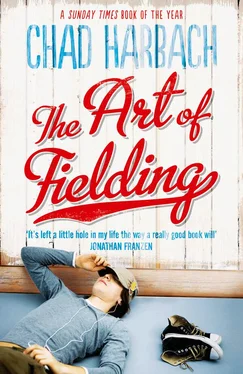Henry stifled a yawn. “I guess so. Where are you?”
“At the VAC, soaking my back. There’s a snowstorm moving in. I thought you might like to get your stadium in before it hits.”
“Okay. Thanks.”
Schwartz glanced down at the letter in his hand. When he dialed the phone, he’d been unsure why he wanted Henry on the line; now he realized he wanted to tell him the whole story. Then they could open the envelope together, share the agony or the ecstasy or whatever. Let the Skrimmer prop him up for once. “Listen,” he said. “I’ve been meaning to —”
“Hey!” Henry sounded suddenly wide awake. “Something weird happened when I got home last night.” He began to recount his conversation with Miranda Szabo.
“Third round?” Schwartz repeated. “She said third round?”
“That’s what she said. Third round or higher. Do you think it was a prank call? I kept imagining one of the softball players on the other end, with Rick and Starblind sitting in the background laughing.”
Schwartz held the letter up to eye level, turned it in his hand. He brought it to his nose and sniffed the loosening glue. He knew what Henry expected of him right now, but it took a good half minute to find words that sounded like words he might say. “It’s real, Skrimmer. This is what life’s going to be like from now on. This is what we’ve been working toward for the past four years.”
“Three years.”
“Right. Three years.” Humidity had detached the flap from the envelope. Schwartz lifted it gently, until he could see the handsome, promising ecru of the paper folded inside. “So the key,” he continued, “is to stick to the plan. You can’t control the draft. And if you can’t control it, it’s not worth your time. You can only control how hard you work today.”
“Right,” Henry said.
“If it happens this year,” he said, “great. If not, it’ll happen next year.” Schwartz let his eyelids fall shut before reaching into the envelope: the trifolded letter, protected from the room’s moisture, felt crisp and promising. Henry was saying something about Peter Gammons, the baseball analyst, but his voice sounded far away. The metal walls of the tub shuddered against Schwartz’s shoulders. He undid the folds of the letter.
“Hello?” Henry said. “Schwartzy?”
Chapter 13
Henry’s breath clouded faintly before his face. Beneath his wind-breaker and sweatshirt and thermal top, over his T-shirt, he was wearing his weighted vest. No snow yet, but the clouds sagged low, like an awning about to collapse. He switched from a walk to a trot and passed from the Small Quad to the Large. Here the buildings were bigger, especially the tinted-glass library and the chapel, which loomed at the north end. The stripped trees shivered in the wind. A single light shone from an upper-floor window of the VAC: Schwartzy’s office.
The stadium, a cavernous stone horseshoe with Roman arches, was built a century ago, and its size indicated some strange ambition. Even for the homecoming game, it was never more than a quarter full. Four mornings a week, Henry came here and charged up the deep, wide concrete steps that served as bleachers, down the shallower ones that served as stairs.
Inside the stadium’s near-enclosure, the silence smelled different. He didn’t bother to stretch — just bounced on his toes a few times, rocked back and forth, and charged up through the dark. The stone bleachers were knee-high and deep, and each step required a leap. A leap of faith, since it was so dark he could barely see the next one. The cold air shocked his lungs. The first time he ever did this, a few months after his arrival at Westish, he slipped and chipped a tooth on Section 3, then sank to the ground after Section 9, wishing he could puke, while Schwartz whispered unflattering remarks in his ear. That was when Schwartz still ran stadiums, the big guy surprisingly nimble. Before his knees got too bad.
Each step sent a frozen jolt up Henry’s spine. Step. Step. Step. What was Schwartz thinking, sending him out here at this hour, in this weather? He liked rising early but this was absurd, more night than morning, no flicker of dawn or stirring of birds to keep him company. Just black cold and those clouds pressing down. He’d hardly slept, worrying about Owen, replaying that throw in his head. Of course if Owen’d been watching the game instead of reading, it wouldn’t have happened, but that didn’t stop Henry from feeling responsible. Then, beyond what he’d done to Owen, there was the simple frustration of messing up in the field, something he hadn’t done in so long he’d forgotten that it was possible. Perfection was what he was after out there. At least those scouts had left before it happened.
After an interminable ascent, he reached the top row and slammed a gloved hand against the big aluminum 1 bolted to the back wall. He gave it a good whack, but the frigid atoms barely resounded at all. When he turned, he was standing atop a steep precipice that fell off into darkness. He kept his back against the wall as he edged, as quickly as his quivering legs would let him, toward the staircase between Sections 1 and 2. He could practically touch the rumpled quilt of cloud overhead.
He minced quickly down the stairs between sections — the descent, though easier on the legs, was the scary part — using his windbreaker sleeve to wipe his nose. His ears burned. At the bottom he turned and gave a little skip and duck, like a high jumper beginning the approach. “Come on!” he growled aloud in Schwartz’s voice, trying to rally himself as he shoved off and headed grimly back to the top, dragging one weary leg before the other, slamming a squeezed fist into the frozen metal 2.
Конец ознакомительного фрагмента.
Текст предоставлен ООО «ЛитРес».
Прочитайте эту книгу целиком, купив полную легальную версию на ЛитРес.
Безопасно оплатить книгу можно банковской картой Visa, MasterCard, Maestro, со счета мобильного телефона, с платежного терминала, в салоне МТС или Связной, через PayPal, WebMoney, Яндекс.Деньги, QIWI Кошелек, бонусными картами или другим удобным Вам способом.










